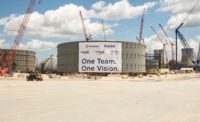Favorable economics for natural gas-fired energy production is putting pressure on builders of Georgia's $14-billion Plant Vogtle nuclear expansion project, with Southern Co. and contractor CB&I facing heightened scrutiny as they deal with continuing cost and schedule overruns.

Philip Hayet, a Georgia Public Service Commission (PSC) analyst, summed up the changed fiscal environment when he testified in early August that, "if a decision had to be made today to build a new nuclear project, it would not be justified."
Even though Southern is using "overstated" natural-gas price forecasts to produce "overly optimistic estimates of the benefits of the project," Hayet claims, it would be less expensive to finish Vogtle than to shut down the project and replace it with a natural-gas-powered plant.
The assessment came on the heels of Southern Co.'s request for a $737-million budget increase for the project. That request was later withdrawn as part of an agreement between the utility and PSC to review these costs upon the completion of the first new nuclear unit, now officially expected in the fourth quarter of 2017. If approved, the increase could be paid mostly by ratepayers.
Meanwhile, Vogtle's project monitors say delays are likely to continue.
William Jacobs and Steven Roetger testified that Southern's most recent target, 2017's fourth quarter, for completing Vogtle 3 is "more reasonable" than its previous 2016 date, but added, "at this time, we are not able to conclude that the schedule is reasonable and achievable."
The monitors said the CB&I and Westinghouse consortium has provided schedules that "extend significantly beyond" Southern's current official completion target.
The main concern surrounds two future construction and engineering hurdles: the setting of the auxiliary building structural module, referred to as CA20, and the erection of the shield building.
The monitors testified, "To date, the consortium has not demonstrated the ability to fabricate high-quality CA20 sub-modules at its Lake Charles, La., facility that meet the design requirements at a rate necessary to support the project schedule." They added that Southern is prohibiting shipment of sub-modules from Lake Charles to the Vogtle site and that "several" of the already delivered sub-modules will require rework at the site.
Overall, the monitors say the fabrication and assembly of building modules is "significantly behind schedule," with the target to set the CA20 module on the nuclear-island foundation having slipped 21 months to date, to this November.
On a positive note, Jacobs and Roetger state that recent changes by CB&I and Westinghouse to the project's management team are "clearly positive" and that they have observed "an attitude of increased cooperation and focus on the critical-path schedule activities."
In an email response to ENR, CB&I spokeswoman Gentry Brann said "certain changes to the management team" were the "result of CB&I's acquisition of Shaw" in 2012. In June, the contractor named John Simmons as project director.
Other issues could affect Vogtle's overall cost and schedule. Litigation between the owner and the contractor over $900 million in disputed costs is ongoing, says Georgia Power spokesman Mark Williams. To date, Hayet noted, the utility has not included a price for this litigation in its cost estimates.
Also, Southern spokesman Tim Leljedal said the utility is still negotiating with the U.S. Dept. of Energy over terms for $8.33 billion in federal loan guarantees that were first announced in 2010.
In recent testimony to PSC, utility executives Kyle Leach of Georgia Power and David McKinney of Southern stated that if the loan guarantees don't come about, the company plans to fund construction "through more traditional means, such as security issuances and term loans."



Post a comment to this article
Report Abusive Comment